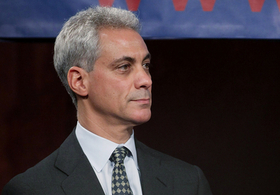 An Illinois Appellate Court has reversed the Chicago Board of Elections ruling allowing Rahm Emanuel to stay on our mayoral ballot next month:
An Illinois Appellate Court has reversed the Chicago Board of Elections ruling allowing Rahm Emanuel to stay on our mayoral ballot next month:
Burt Odelson has argued Emanuel doesn't qualify to be on the ballot because the former White House chief of staff doesn't meet a requirement that the mayor of Chicago live in the city for one year before taking the office. "You can't mentally just have a residence," Odelson said last week after arguing before the appeals court. "You have to have a residence. You have to go somewhere."
Emanuel's attorneys have argued their client never abandoned his North Side home when he went to work in Washington, D.C. Both sides say they are prepared to take the case to the Illinois Supreme Court.
In the 24-page ruling, Justices Thomas Hoffman and Shelvin Louise Hall found that Emanuel didn't meet the one-year residency period required of municipal candidates, and that his service as President Obama's chief of staff didn't land him an exception for being away from home "on the business of the United States:"
Section 3-2's "business of the United States" exception is housed not only in the Election Code, but in a portion of the Election Code dealing exclusively with voter qualification, in fact in an Article titled "Qualification of Voters." See 10 ILCS 5/3-1 through 3-5 (West 2008).
As explained above, the Municipal Code sets forth two qualifications for candidates: they must meet the Election Code’s standards for a "qualified voter," and they must have "resided in" the municipality for one year preceding the election. The location of section 3-2's "business of the United States" exception—in the Election Code, and in an article of the Election Code dedicated exclusively to voter qualification—supports the conclusion that the exception applies only to the Election Code’s "qualified voter" standard, and not to any supplemental candidate qualifications located outside the Election Code.
Justice Bertita Lampkin dissented:
The majority failed ... to move past the issue of establishing residency to the relevant analysis, which turns on whether the candidate’s residency, which he had indisputably held, was abandoned when he worked in Washington, D.C., and leased his Chicago home.
The Board’s ruling—that the candidate in 2009 and 2010 did not abandon his status as a resident of Chicago and, thus, remained a resident of Chicago even though he was largely absent from this city from January 2009 until October 1, 2010—was not clearly erroneous. Intent is an issue of fact (Delk, 112 Ill. App. 3d at 738), and the majority acknowledges that the Board’s fact findings were not against the manifest weight of the evidence. This acknowledgment should have ended this case, and resulted in this court affirming the circuit court’s judgment, which confirmed the Board’s ruling that the preponderance of the evidence established that the candidate never formed an intent to either change or terminate his residence in Chicago, or establish his residence in
Washington, D.C., or any place other than Chicago.
Because the candidate had established his Chicago residency, it is presumed to continue until the contrary is shown, and the burden of proof is on the person who claims that there has been a change.
Justice Lampkin further noted:
Finally, the majority’s decision certainly “involves a question of such importance that it should be decided by the Supreme Court.” Supreme Court Rule 316 (Official Reports Advance
Sheet No. 26 (Dec. 20, 2006), R. 316, eff. Dec. 6, 2006. Consequently, I believe this panel should certify this case under Supreme Court Rule 316, which would permit review of the majority’s decision in the most expeditious manner possible. The majority, however, has refused to certify this case under Rule 316. As of the writing of this dissent, there is less than one month before the election and even less time for absentee ballots to be mailed out and returned. An opinion of such wide-ranging import and not based on established law but, rather, on the whims of two judges, should not be allowed to stand.
That means the Supreme Court may not hear the case in time for the start of early voting next week.
It's a good thing for Rahmbo that "Emanuel" is easier to spell than "Murkowski."